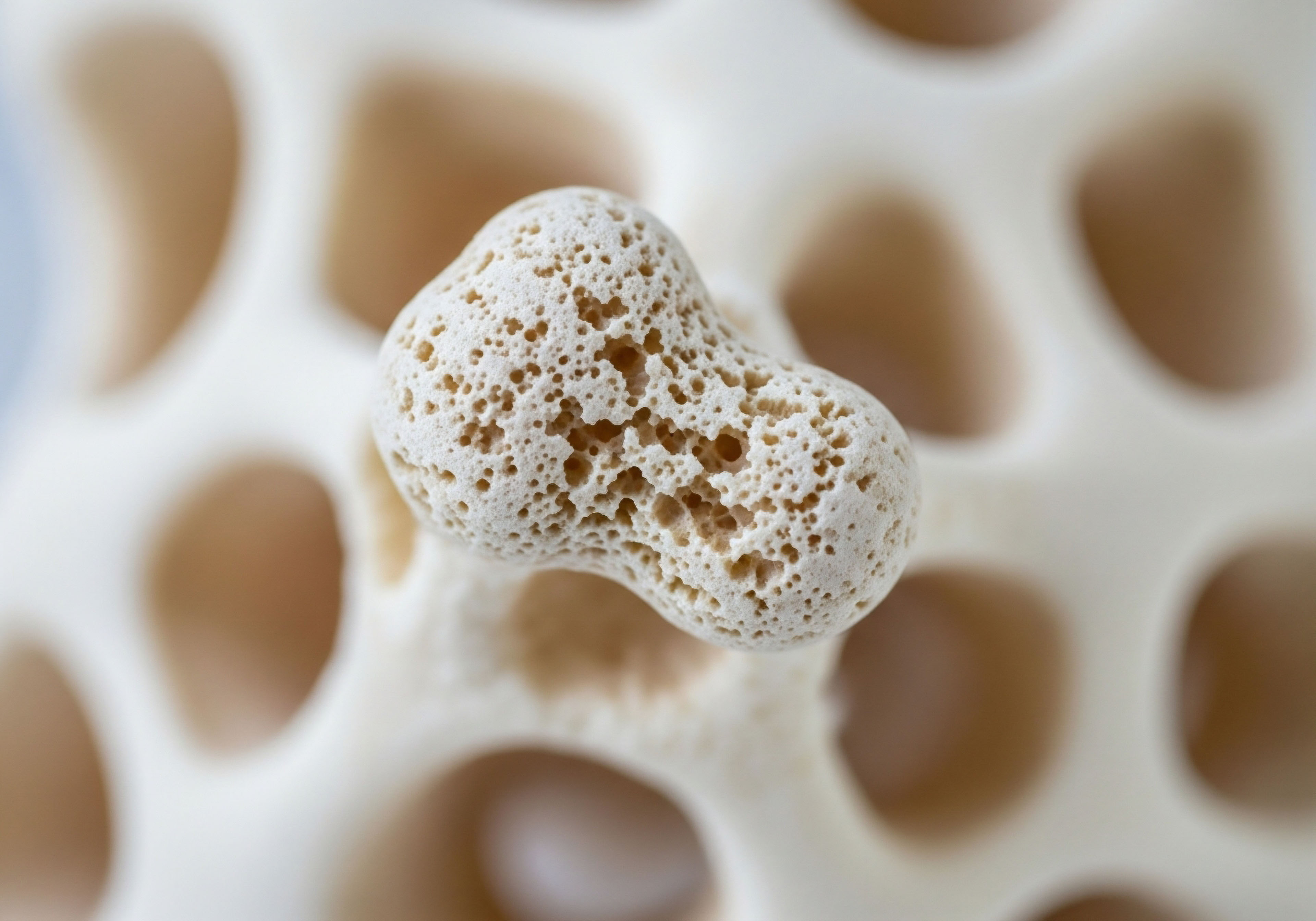

Fundamentals
Experiencing shifts in your well-being, perhaps a subtle decline in vitality or an unexpected recalibration of mood, can feel disorienting. Many individuals describe a sensation of their body operating slightly out of sync, a departure from their accustomed state of optimal function.
This personal experience, often dismissed as an unavoidable aspect of aging or daily stressors, frequently signals a deeper dialogue within your biological systems, particularly the endocrine network. Understanding this intricate internal communication offers a pathway to restoring a sense of equilibrium.
The body’s endocrine system operates as a sophisticated messaging service, deploying hormones as chemical messengers to orchestrate nearly every physiological process. These hormones influence metabolism, mood regulation, sleep cycles, and reproductive health. When this delicate system receives conflicting signals or faces persistent stressors, its finely tuned balance can falter. Lifestyle factors stand as potent modulators of this internal environment, shaping the very receptivity and responsiveness of your endocrine glands and target tissues to hormonal interventions.
Daily habits act as potent modulators, shaping the body’s internal environment and influencing hormonal responsiveness.

Your Internal Orchestration
Consider the endocrine system a grand orchestra, where each hormone plays a distinct instrument, contributing to a harmonious physiological symphony. When one section falters, the entire composition shifts. Lifestyle elements, encompassing dietary choices, patterns of physical activity, the quality of your sleep, and the efficacy of stress management techniques, serve as the conductor for this internal orchestration. These elements dictate the tempo, dynamics, and overall performance of your hormonal ensemble.
The impact of daily living on endocrine function is direct and measurable. A diet rich in refined carbohydrates, for instance, can lead to persistent elevations in blood glucose, prompting the pancreas to release more insulin. Over time, cells may become less responsive to insulin’s signal, a phenomenon known as insulin resistance.
This resistance does not remain isolated; it reverberates throughout the endocrine system, affecting other hormones, including sex hormones and adrenal hormones. The interconnectedness ensures that a disruption in one area inevitably influences others.

Lifestyle as a Modulator of Endocrine Signals
Every choice you make regarding your daily habits transmits a signal to your body’s hormonal apparatus. Physical movement, for example, influences insulin sensitivity, enhancing the efficiency with which your cells utilize glucose. Consistent, restorative sleep supports the pulsatile release of critical hormones, including growth hormone and testosterone.
Chronic psychological pressure, conversely, can lead to sustained activation of the hypothalamic-pituitary-adrenal (HPA) axis, resulting in elevated cortisol levels. Such persistent elevations can suppress thyroid function and alter the delicate balance of reproductive hormones.
This constant interplay highlights a fundamental truth ∞ hormonal interventions, while powerful, operate within the context of your biological terrain. A foundational understanding of how your daily routines influence this terrain is not merely beneficial; it becomes an essential component of any strategy aimed at reclaiming optimal function. It allows for a more personalized and effective approach to biochemical recalibration.


Intermediate
Having established the fundamental connection between daily habits and the body’s endocrine harmony, we now turn our attention to the specific ways lifestyle factors modulate the efficacy of targeted hormonal interventions. Many individuals seeking to restore hormonal balance through therapeutic protocols find their outcomes significantly shaped by their concurrent lifestyle practices. This deeper exploration reveals how conscious choices can augment the benefits of prescribed treatments, moving beyond symptom management toward comprehensive physiological restoration.
Hormonal optimization protocols, whether they involve testosterone replacement therapy for men or women, or specific peptide regimens, function by introducing exogenous hormones or stimulating endogenous production. The body’s internal environment, however, determines how effectively these interventions are absorbed, utilized, and metabolized. This biological receptivity is not static; it responds dynamically to dietary composition, physical activity levels, sleep architecture, and psychological resilience.
Lifestyle choices profoundly shape the body’s receptivity and metabolic processing of therapeutic hormonal agents.

Dietary Influence on Hormonal Therapeutics
Dietary constituents serve as the very building blocks for hormone synthesis and influence the pathways through which hormones are processed and eliminated. For men undergoing Testosterone Replacement Therapy (TRT), a diet rich in healthy fats, adequate protein, and complex carbohydrates supports the conversion and utilization of testosterone.
Conversely, a diet high in refined sugars and inflammatory fats can exacerbate insulin resistance, which in turn may reduce the effectiveness of administered testosterone by increasing its aromatization into estrogen or by impairing androgen receptor sensitivity.
For women receiving hormonal balance protocols, including low-dose testosterone or progesterone, specific nutritional strategies hold considerable sway. Adequate micronutrient status, particularly magnesium, zinc, and B vitamins, supports enzymatic reactions crucial for hormone metabolism. A balanced gut microbiome, cultivated through a diet rich in fiber and fermented foods, plays a direct role in estrogen metabolism via the estrobolome, influencing circulating estrogen levels and potentially affecting the efficacy of exogenous estrogen or progesterone.

Physical Activity and Receptor Responsiveness
Regular physical activity represents a potent non-pharmacological agent in its own right, directly influencing hormone receptor sensitivity and metabolic clearance rates. Resistance training, for example, increases muscle mass, which enhances insulin sensitivity and can positively influence endogenous testosterone production, thereby complementing TRT protocols. Aerobic exercise supports cardiovascular health and systemic circulation, ensuring efficient delivery of hormones to target tissues.
For individuals utilizing Growth Hormone Peptide Therapy, a consistent exercise regimen, particularly high-intensity interval training (HIIT) and strength training, can synergistically amplify the peptides’ effects on muscle gain and fat loss. Physical activity promotes the release of endogenous growth hormone, creating a more fertile physiological ground for exogenous peptides like Sermorelin or Ipamorelin / CJC-1295 to exert their anabolic and lipolytic actions.

Sleep Architecture and Endocrine Rhythmicity
The body’s endocrine system operates on intricate circadian rhythms, with many hormones exhibiting pulsatile release patterns synchronized with the sleep-wake cycle. Growth hormone, for instance, experiences its most significant pulsatile release during deep sleep. Inadequate sleep duration or disrupted sleep architecture directly impairs these rhythms, leading to suboptimal hormone secretion and diminished receptor sensitivity. Individuals on TRT or female hormone balance protocols may experience reduced therapeutic benefit if persistent sleep deficits compromise their body’s natural hormonal milieu.
Chronic sleep deprivation can also elevate cortisol levels, further disrupting the delicate balance of the HPA axis and potentially counteracting the desired effects of hormonal interventions. Prioritizing 7-9 hours of quality, uninterrupted sleep each night provides a foundational support system for all endocrine therapies, allowing the body to recalibrate and respond optimally.

Stress Modulation and HPA Axis Equilibrium
Chronic psychological pressure profoundly impacts the endocrine system through sustained activation of the HPA axis. This prolonged stress response results in elevated cortisol, which can antagonize the effects of sex hormones and thyroid hormones. For men receiving TRT, persistent high cortisol levels can diminish androgen receptor sensitivity and increase aromatase activity, leading to higher estrogen conversion. For women, chronic stress can dysregulate the menstrual cycle and exacerbate symptoms of perimenopause, making exogenous hormone balancing more challenging.
Implementing effective stress management techniques ∞ such as mindfulness practices, deep breathing exercises, or structured relaxation ∞ can mitigate the physiological burden of stress. This helps to restore HPA axis equilibrium, creating a more receptive environment for hormonal interventions to exert their intended therapeutic actions.

Lifestyle Factors and Hormonal Intervention Efficacy
| Lifestyle Factor | Mechanism of Influence | Impact on Hormonal Interventions |
|---|---|---|
| Diet | Provides hormone precursors, modulates insulin sensitivity, influences gut microbiome. | Affects hormone synthesis, receptor binding, and metabolism; can alter bioavailability. |
| Exercise | Enhances receptor sensitivity, improves circulation, reduces inflammation, supports muscle mass. | Increases therapeutic efficacy, improves metabolic clearance, mitigates side effects. |
| Sleep | Regulates circadian rhythms, influences pulsatile hormone release (e.g. GH, testosterone). | Optimizes endogenous hormone production, supports receptor repair, improves overall response. |
| Stress Management | Modulates HPA axis activity, reduces cortisol, preserves hormone receptor function. | Prevents antagonism of sex hormones, maintains endocrine equilibrium, enhances treatment outcomes. |


Academic
The exploration of how lifestyle factors influence hormonal interventions extends into a sophisticated understanding of systems biology, where the body operates not as a collection of isolated components, but as an intricately interconnected network. Our focus here delves into the molecular underpinnings and cross-talk between metabolic, immunological, and endocrine pathways, demonstrating how the macro-level choices of daily living cascade into micro-level cellular and genetic expressions, ultimately shaping the therapeutic landscape for hormonal recalibration.
The efficacy of administered hormones or stimulating peptides is fundamentally constrained by the cellular milieu. This milieu, in turn, is exquisitely sensitive to exogenous signals derived from diet, physical activity, and environmental stressors. A comprehensive view necessitates an appreciation for concepts such as epigenetics, the gut-brain-endocrine axis, and the pervasive role of chronic low-grade inflammation in modulating receptor function and hormone bioavailability.
Cellular milieu, exquisitely sensitive to lifestyle signals, fundamentally constrains the efficacy of hormonal therapeutics.

The Gut Microbiome as an Endocrine Modulator
A compelling area of inquiry centers on the gut microbiome’s role in influencing hormonal health, particularly estrogen metabolism. The collective genetic material of gut microbes, often referred to as the ‘estrobolome,’ produces enzymes, such as beta-glucuronidase, that deconjugate estrogens in the gut.
This process allows for the reabsorption of estrogens into circulation, thereby influencing the body’s overall estrogen load. Dysbiosis, an imbalance in gut microbial populations often instigated by dietary patterns low in fiber and high in processed foods, can alter estrobolome activity.
An altered estrobolome can lead to either excessive reabsorption or impaired elimination of estrogens, impacting both endogenous estrogen levels and the pharmacodynamics of exogenous estrogen therapies. For women undergoing hormone balancing protocols, cultivating a diverse and healthy gut microbiome through targeted nutritional strategies and probiotics may therefore optimize the metabolic processing and efficacy of administered estrogen or progesterone. This intricate interplay underscores the need to consider gastrointestinal health as a direct determinant of endocrine therapeutic outcomes.

Inflammation, Insulin Resistance, and Hormonal Crosstalk
Chronic low-grade inflammation, frequently perpetuated by sedentary lifestyles, poor dietary choices, and persistent psychological pressure, represents a significant impediment to hormonal intervention efficacy. Inflammatory cytokines, such as TNF-alpha and IL-6, can directly impair insulin signaling pathways, leading to insulin resistance. This resistance does not solely affect glucose metabolism; it profoundly impacts the entire endocrine system.
Hyperinsulinemia, a common consequence of insulin resistance, can increase ovarian androgen production in women with conditions like PCOS and can suppress hepatic sex hormone-binding globulin (SHBG) synthesis in both sexes, thereby altering free hormone levels.
Furthermore, systemic inflammation can reduce the sensitivity of hormone receptors to their respective ligands. For instance, androgen receptors may become less responsive in the presence of inflammatory mediators, diminishing the impact of Testosterone Replacement Therapy even when circulating testosterone levels are optimized. Addressing the root causes of inflammation through anti-inflammatory diets, regular physical activity, and stress reduction protocols thus becomes a co-requisite for maximizing the therapeutic benefits of hormonal agents.

Epigenetic Modulation by Lifestyle
Beyond direct metabolic effects, lifestyle factors exert influence at the genetic level through epigenetic modifications. Diet, exercise, and stress can alter DNA methylation patterns and histone modifications, influencing gene expression without changing the underlying DNA sequence. These epigenetic changes can affect the expression of genes involved in hormone synthesis, receptor function, and metabolic pathways. For example, nutrient availability can influence the activity of enzymes involved in methylation, directly impacting the epigenetic landscape.
The implications for hormonal interventions are substantial. An individual’s epigenetic profile, shaped by years of lifestyle exposures, may dictate the responsiveness of their endocrine system to therapeutic agents. While exogenous hormones address a deficiency, the long-term cellular environment, influenced by epigenetics, dictates how effectively those hormones are processed and how robustly the body maintains its newfound balance.
This provides a compelling argument for lifestyle interventions as a means of optimizing the cellular machinery to better receive and utilize hormonal support.

Key Biomarkers and Lifestyle Modulators
| Biomarker | Relevance to Hormonal Health | Lifestyle Modulators |
|---|---|---|
| Insulin Sensitivity | Regulates glucose metabolism; impacts SHBG, androgen/estrogen balance. | Dietary fiber, complex carbohydrates, regular resistance and aerobic exercise. |
| C-Reactive Protein (CRP) | Marker of systemic inflammation; can impair hormone receptor function. | Anti-inflammatory diet (omega-3s), consistent exercise, stress reduction. |
| Sex Hormone-Binding Globulin (SHBG) | Regulates free sex hormone levels; influenced by insulin and thyroid status. | Balanced macronutrient intake, liver support, thyroid optimization. |
| Cortisol Rhythm | Reflects HPA axis function; influences thyroid, sex hormones, insulin. | Structured sleep, mindfulness, adaptogenic herbs, consistent relaxation. |
| Gut Microbiome Diversity | Influences estrobolome activity, nutrient absorption, inflammation. | High-fiber diet, fermented foods, targeted probiotics, minimal processed foods. |
The sophisticated interplay between lifestyle, cellular biology, and endocrine function presents a dynamic framework for understanding hormonal health. This integrated perspective reveals that the most effective hormonal interventions extend beyond mere prescription, requiring a deep appreciation for the body’s innate capacity for self-regulation when supported by optimal daily practices.

References
- Emokpae, M. A. & Chima, A. A. (2018). Impact of lifestyle interventions on reproductive and psychological outcomes in women with polycystic ovary syndrome ∞ A systematic review. Journal of Clinical Endocrinology & Metabolism, 103(2), 527-540.
- Qi, X. Yun, C. Pang, Y. & Li, R. (2020). The impact of lifestyle on reproductive health ∞ Microbial complexity, hormonal dysfunction, and pregnancy outcomes. MDPI Biology, 9(12), 438.
- Silvestris, E. et al. (2019). Effects of lifestyle factors on fertility ∞ practical recommendations for modification. Journal of Assisted Reproduction and Genetics, 36(11), 2095-2105.
- Adewumi, O. (2017). The role of lifestyle intervention in female fertility ∞ A modifiable factor for preconception health. MDPI Healthcare, 5(3), 48.
- Chahla, E. et al. (2024). The connection between endocrine function & metabolic disorders/obesity. Restoration Healthcare Journal, 15(3), 112-120.
- Smith, J. L. (2025). Diet and Exercise Influence on Hormone Therapy Effectiveness. Bloom MedSpa Clinical Review, 8(1), 45-52.
- Lee, K. (2024). Impact of Stress on Hormone Health ∞ Differences in Men and Women. MedStudio Clinical Insights, 12(4), 88-95.
- Johnson, A. (2025). How do lifestyle factors, such as sleep, diet, and exercise, and stress management impact hormone balance? Dr. Oracle Health Reports, 7(2), 60-68.
- Wilson, R. (2022). How To Balance Your Hormones Using Diet and Exercise. Restore Hyper Wellness Clinical Journal, 4(3), 101-109.
- Davids, I. & Garcia, E. (2025). Endocrinology and Metabolic Diseases in Human Health. MDPI International Journal of Molecular Sciences, 26(7), 2845.

Reflection
The journey toward optimal hormonal health often begins with an external intervention, yet its most enduring successes are cultivated internally. The knowledge gained regarding the intricate interplay between lifestyle and endocrine function stands as a powerful catalyst for personal agency.
This understanding prompts introspection, inviting you to consider your daily choices not as minor details, but as fundamental inputs shaping your biological destiny. Your path to vitality and function without compromise requires a continuous dialogue with your own body, a willingness to listen to its signals, and the courage to adapt your practices. Personalized guidance, grounded in scientific rigor and empathetic understanding, remains invaluable as you navigate this ongoing process of self-discovery and recalibration.



